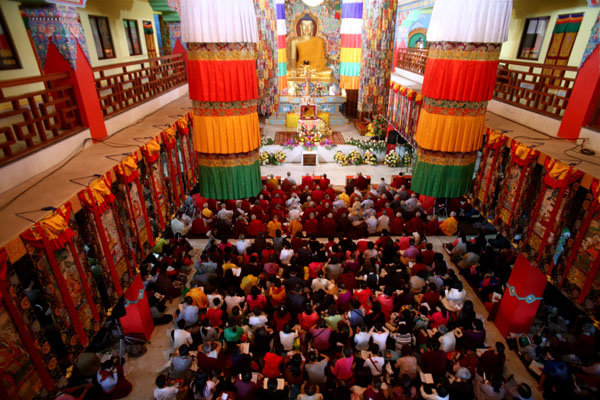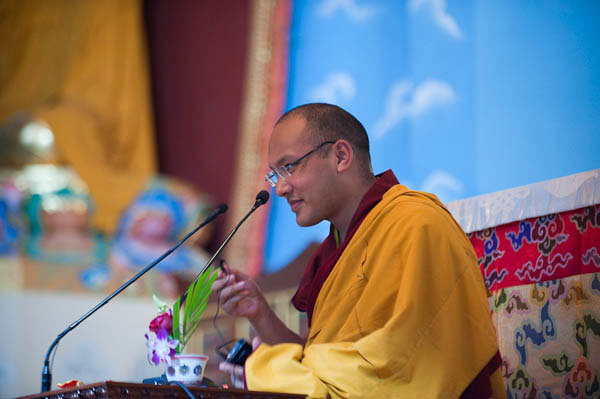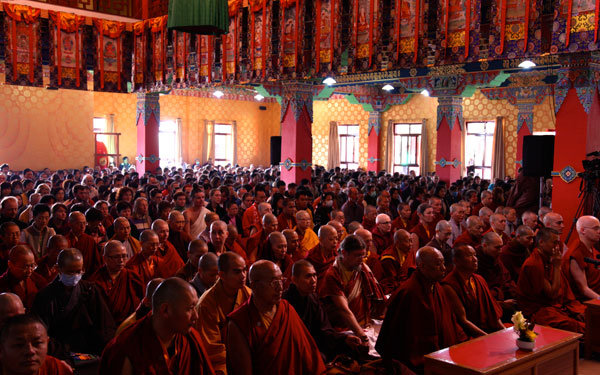法王新闻 | 2009年12月
『第27屆噶舉祈願』第1天:龍樹親友書•第二堂课
『27th Kagyu Monlam』Day 1: Nagarjuna’s 「A Letter to A Friend」•Afternoon Session

時間:2009年12月20日下午 20 Dec., 2009 3:00-5:00pm
地點:印度 菩提迦耶 德噶寺 Tergar Monastery in Bodhigaya, India
中文翻譯:堪布丹傑
主办单位:噶舉大祈願法會組織 Kagyu Monlam
法王禮佛三拜
梵文三皈依
法王念誦祈請文
午安。
早上FM似乎不理想,希望大家沒受影響。
(法王繼續說上午已進行之《龍樹親友書》第4偈)
After offering three bows and prayers, His Holiness continued his teaching on Nagarjuna’s Letter to a Friend. in the afternoon of December 20, 2009.
六隨念:隨時憶念「佛、法、僧、施、戒、天」
早上是特別提到在家人和出家人共同的修持方式「六隨念」,要隨念、隨時憶念佛法僧三寶,隨念布施,隨念戒,還有要隨念「天」。
天界的天人因為修持「止」,具有神通,有能力隨時看到我們的狀態,我們只要隨時想到天人能看到我們,就能不放逸。另外,投生天界 投生之因是行善,要得到投生天界的果,就要行善,這是「隨念天」的另一層意思,就是隨時要記得行善,隨時憶念行善的功德。
佛陀在世時,印度人多半信仰大梵天等印度教天神,所以佛陀這說法,是符合當時的環境和因緣。但「隨念天」主要是要提醒隨念行善的功德。
There are benefits that come from bringing to mind the gods who live in the higher realms. In order to arrive at their high status, they needed to develop their practice of peaceful abiding (shamatha), so remembering their achievements can have the positive effect of our becoming more mindful and aware. We can also recall that in order to arrive at a rebirth in a higher realm, the gods had to engage in numerous virtuous actions. So we should bring to mind how the gods attained their rebirth. Being a powerful god is the result of positive actions.
第5偈 The Verse Five:
十善諸業道,With body, speech, and mind always rely
身語意常親,On wholesome deeds, the tenfold virtuous path.
遠離於諸酒,Avoiding liquor at all costs, thus find
亦行清淨命。True joy to lead a life of virtuous deeds.
第5偈是提醒「行持十善」。今天下午,主要說行持十善和斷除與之相反的十惡。
The ten wholesome, or virtuous actions, are to avoid the ten unwholesome or unvirtuous ones. We should understand why it is important to follow this teaching, for it leads us away from what is not harmonious with Dharma and turns us towards what is.
佛典所說,可概分大乘和聲聞乘。戒律是一切的基礎,在南傳聲聞乘中,關於僧伽戒律有非常多說法,「別解脫戒」,是一切功德的基礎,一切修持之根基,所謂「別解脫戒」有七種或八種。在家居士也有很多不同的居士戒,今天在場主要是在家的法友,各位也都是佛法修持者,所以特別介紹在家居士戒的內容。最根本的居士戒是「皈依」,法本中有「自皈依法,不傷害眾生」這樣一段話,這段皈依文字我覺得非常重要,開始修持佛法之後,最重要的就是不傷害任何一個有情眾生。什麼叫「不害他」呢?要從基礎開始都「不害」其他眾生;什麼叫「害他」?我們會透過身體的三種行為、語言的四種行為來傷害眾生。另一種則是從基礎上,從心裡傷害眾生,也就是透過貪心、嗔害心、邪見三種意念傷害眾生。
In the Vinaya, a positive way of life is emphasized through respect for the rules of conduct. There is a lot say about this, but not much time, so we will focus more on the life of the householder, who develops respect for the Dharma.
First let us look at vows. Taking refuge in the three jewels is the basis for all other vows. Any other kind of Buddhist vow we might take is based on refuge. If we take refuge, we can become an upasaka (a lay holder of vows).The initial promise we make when taking refuge is not to harm living beings and refrain from violence. The first practice of Buddhism is not to harm others. In particular, abstaining from harming is the basis of the Foundational Vehicle.
Not harming can be understood in terms of avoiding the ten unwholesome actions: the three related to the body (killing, stealing, and sexual misconduct); the four related to speech (lying, harsh words, gossip, and divisive talk); and the three related to the mind (wishing to harm others, envy, and wrong view). All of these actions injure others. If we are able to purify our minds, then doing harm to others along with its very basis is eliminated.
- 害心
- 貪心
- 邪見
當我們說不害他,主要是指身、語兩種行為,但傷害的基礎是害他的心,也要斷除傷害眾生的三種意念,而這些意念都是從煩惱而出生,如何對治煩惱,就是依止「戒律」。所以其實不只大乘說心裡要有眾生、為解脫眾生苦而修行,南傳的戒律中也提到「不傷害眾生」。
在「利他」之前,要先能「不害他」,要控制得了自己的情緒,控制得了自己的煩惱,否則雖有好發心,最後卻因自己的心失控,反而傷害別人。所以要如南傳經典所說,先從「不傷害眾生」做起。
The mind is the basis of the first seven unwholesome actions of body and speech, which directly harm others. If the three negative mental actions are not present, then the negative actions of body and speech will not happen. If we eliminate negative actions and the afflictions (klesha) from our mind, we will naturally have a mind that benefits others, because the ten negative actions of the mind stem from the afflictions of hatred, excessive desire, and ignorance. Therefore, giving these up relates directly to not harming others.
Hinayana also speaks of not harming others. Sometimes we may think that the Mahayana is the only path of compassion, but that is not completely true. The extent of the compassion may differ, as the Mahayana aspiration is for all living beings, but in the Foundational vehicle there is a very strong desire not to harm others. If we speak only of not harming others, it is difficult to separate the Hinayana from the Mahayana.
Motivation is extremely important. In the beginning, we may have a good motivation, but if we have not worked on eliminating our negativity, then we could harm others later. Meditation helps us to work on our afflictions. We can learn to subdue and control our anger, for example, and in general, our minds will become more flexible. If we do not meditate, we may start with intention to help others, but it is possible that our negativity will return and subvert what we are trying to do, so we could wind up harming others.

《俱舍論》中說十惡,身三、口四(以身實際造作的三種惡行,和以語言造作的四種惡行)七種惡行,稱為「業」;至於以心念所造、關於心的三種惡行,稱為「業之道」,「業之道」還不是業。身、口惡行已有行為,因此有懺悔的各種儀式,而心上的惡還未有行為,則可靠發露懺悔還淨。譬如從生起「想殺之念」,到真的殺人,中間有一段時間,光是「想殺」還不是惡業,在真正行動之前,在這段還未形成行為過程中,可以告誡自心,讓惡念轉為善。要小心覺察自己的心,從生起意念,到真正行動之前,我們都還有機會不讓它轉為惡業。
According to the Abhidharmakosha, the first seven negative actions (the three of the body and the four of speech), are karmic actions; the three of mind are not karmic actions, but create the path through which actions happen.
If we commit a negative action, we can make a firm resolution not do it again. Then we can purify the negativity in front of a Dharma support, such as a statue or image of the Buddha. Our motivation should be so strong that even at the risk of our lives, we would not do it again.
If we take as an example, the negative action of killing, then we can see that it starts with rejection or aversion. At this point, however, the action is not complete, so we have time to stop it. There are many different stages so we can tell ourselves why we should not kill and change our intention. If you can catch it at this stage, then an action is not complete. So our intention is the main thing and it allows us to catch a negative action before it happens.
接著說貪心。最近達蘭莎拉常有電腦被偷,我就舉電腦為例。你看到一台很漂亮的電腦,你會想「它真漂亮呀」,接著想「它功能真多啊」、「能得到多好呀」、「如果得不到多painful,多痛苦呀」,心念這樣不斷思維運作,接著就會覺得「就算我死了也要得到這台電腦!」,整個腦子只剩這個想法,這時「你真的生起貪心了!」會導致造惡的貪心,就這樣生起了。你繼續這樣想,它就會真正進入你心中,在你心中沈睡(隨眠煩惱)。有一天當你真的再看到像這樣的一台電腦,心中那一念沈睡的貪念就會甦醒,接著就可能付諸行動了。貪的惡行就是這樣運作的。殺也一樣,先是生起一念嗔心,不斷的想,就會生起害心,接著殺念就會進入心中,睡進你心裡,然後有一天因緣和合,就可能真的付諸行動殺人。
所以要注意的是,當嗔害心生起,如果沒有察覺、對治、轉化,有一天它就可能成為害他的行為。所以要有覺性、覺照力,隨時注意自己每個起心動念,隨時保持正知正念,別讓嗔念進入心中、養成習慣,否則久了真的會做出傷害眾生的事。
You might think that the three negative actions related to mind happen so quickly that there would be no time to change them. But it is possible. For example, suppose you really wanted a certain computer. First you think of computer—how critical it is to your life; how beautiful it is, how useful, and so forth. You think of all the good things connected with it and you convince yourself that you have to have that very computer. Your life will go well. You’ll finally be happy. If you don’t have it, you’ll be just miserable. Finally, you think , “I must absolutely have that computer.” You mind narrows down around this one thing and becomes stuck to it. So there is a process here and there is time to interrupt it. First we have the thought related to a negative emotion, then an object for it appears, and finally we do something negative.
We must be mindful, aware, and conscientious, because these patterns repeat themselves. When problems arise, they provide an occasion for these afflictions to surface. So we have to apply ourselves again and again to identifying and halting negative thoughts.
Working with our minds is especially important, because the mind is the source of our physical and verbal actions. If we do not this, then our negative actions become like thieves who steal away our merit and virtues. If we are involved in any of the ten negative actions, we will accumulate karma. So our intention to improve ourselves and change is very important. If we do not have this positive motivation, then transforming ourselves is very difficult. Mindfulness and awareness are arising with every moment and we should try to maintain this continuum and not waver from it because negative actions can be halted by mindfulness.
這一點,我今天要好好說一說。
《俱舍論》中說,對於出家眾而言,生活上的修持比較難;對在家眾來說,困難的是見解。出家人為了生活,可能會討好施主,或裝模作樣,戒律沒持好卻說自己持戒清淨。在家人則是見地上常會有問題,斷除邪見,是很困難的,雖受皈依戒(「自皈依佛,不皈依天魔外道」),但一生病就覺得三寶沒用,就拿香拿花,求神問卜去了。有些佛弟子生意不好就修財神法,生病就修度母法,不是說有多不對,但把解脫法拿去作世間的用途,就不算正信。最近很多弟子喜歡 跑去找上師問卜,請上師「禪觀」一下吉凶。其實佛陀2500年前就幫我們卜了一卦,那是最靈最重要的一卦,就是「善有善報,惡有惡報」;最好的供養,就是心中勤修戒定慧三學,要有因果觀,這才是我們真正要相信的卦。
The third negative action related to the mind is wrong view. In the Abhidharmakosha, it is said that for monastics, it is difficult to avoid wrong view because they are dependent on others: They beg for food and rely on other people for donations. This may led them to say something in order to receive offerings; they could play the dancing monkey for their sponsors.
一個在家人有一百種持守居士戒的方式。南傳「說一切有部」中說,真正的居士是全部居士戒都要持,經部以上的宗派是不一定全部都要持才算居士。
For lay people it is difficult to avoid wrong views due to the way that they use divinations (Tibetan, mo). When they encounter difficulties, lay people tend to ask for a mo. They also practice Dzambhala to accumulate wealth or Tara if they are sick. This is not the right way to apply the Dharma, because we are using it to gain worldly benefits. These are the kinds of mistakes lay people make.
Actually, the Buddha already made an excellent mo for us. He said that if we engage in virtuous actions, the results will be virtuous; if we engage in negative actions, the results will be negative. This is very clear. The most effective mo is to practice virtue.
以十惡中「殺生」為例。斷「部分殺生戒」(如「我不殺扎西」)這就有十種,第二種是「我不殺大部分的人」也有十種,第三種是「我不殺所有的人」也有十種,共三十種)。也有依時間起誓,如「從早到晚」不做,即以短時間起誓;還有以「長時間」不做,譬如一個人活到四十歲,就是從一到三十九歲都不做;還有一種是「我一生都不做」,即全部時間都不做。
讓人斷除十種惡行,亦有十種戒。見人斷除惡行而隨喜,亦有十種戒。於每一人亦各有「不殺」「不盜」「不淫」「不妄」等十種算法。(法王開玩笑說,對你們來講,可能很容易,只要心裡想「我不殺噶瑪巴」、「我不偷噶瑪巴的東西」,就是居士了,這樣不是很簡單嗎?)要成為居士,有很多持戒的選擇,並不很困難。
In working with negative actions, it is also very helpful to take vows. They give constancy to our actions and provide a counteracting force to our negative tendencies. They also serve as a basis for awareness. There are hundreds of ways to take vows. One way is related to number of people. For example, first we meditate on not killing. Then we can vow not to injure one person, a group of people, or no one at all. In terms of time, we can take a vow for one day, one month, one year, or until you die. You could also take a vow not to kill or seal from the Karmapa (laughter).
If someone takes a vow to give up any, some or all of the negative actions, we should praise and encourage them, and also rejoice. We should all train in avoiding the ten negative actions.
Another way of working with the afflictions is to look into how they come about. We can examine to see: Where did this negative action come from? Where does it stay? Where does it go?
此外,也不可喝酒、吃迷幻藥、毒品等讓我們喪失心性、放逸、迷惑的東西,都算是「酒」。
清淨命,就是正確的生活方式。不過五邪命的生活,如賣毒品、武器、肉、生命等等,或不是販賣而是依靠這個而生活,都是「不淨命」。

明天會講解「六度」的內容。以前大家都學過, 今晚回去要先好好想一想。
The last two lines of Verse Five state:
Avoiding liquor at all costs, thus find
True joy to lead a life of virtuous deeds.
This applies to both the lay and ordained sangha. For those with lay vows, there are negative ways to earn a living, such as selling alcohol, selling poisons, killing others, and selling meat. However, the main negative actions are all contained with in the ten that we should abandon. We should also practice the six perfections. These are very important.
■問答 Question and Answer Session
問:有一段時間沒見上師,就會痛哭流涕,這是瘋了嗎?這是一種煩惱嗎?
Question: When we are separated from our root teacher, sometimes we are moved to tears from longing. Is this crazy?
答:瘋?怎麼算瘋,有正念是不會瘋的。信心的力量是很大的善念,思維上師而掉下的眼淚是很大的功德。(法王開玩笑說,如果你有很多這種信心的善功德,請分一點給我。)
Answer: Not really. When we recall the positive qualities of our teacher and are moved to tears, that is devotion. It is positive and strong. If you’re oversupplied, perhaps you could pass some along to me (laughter).
問:什麼是「世間八法」?
Question: How should we understand the eight worldly dharmas or concerns?
答:世間八法(利衰毀譽稱譏苦樂),有白、黑和花三種。黑,是完全只想到自己,不想別人,只想此生,具有這種強烈動機,就是黑世間八法;至於「白世間八法」和「花世間八法」指的是喜歡別人的讚嘆,不喜歡別人的毀謗,但即使在道上的人也難免。主要是要斷除「黑世間八法」。
Answer: We can understand the eight, (gain and loss, praise and blame, pleasure and pain, fame and infamy), as belonging to three types: white, black, and mixed. The black dharma is a concern only for this life; one looks to benefit oneself and does not think of others. The white dharma is concern for others. The mixed dharma is what most of us have, black and white together. Genuine Dharma is not just for this life, but for life after life.
法王帶領大眾唱梵文〈觀音修持儀軌〉。
网页修改记录:2020年6月13日,建于原‘法王开示’栏目,仅kagyuoffice.org.tw拷贝之文本;2020年12月25日,移至此处;2022年1月04日,网页改版,增加YOUTUBE视频链接;2024年2月14日,放置剪辑音频。
Youtube 视频


